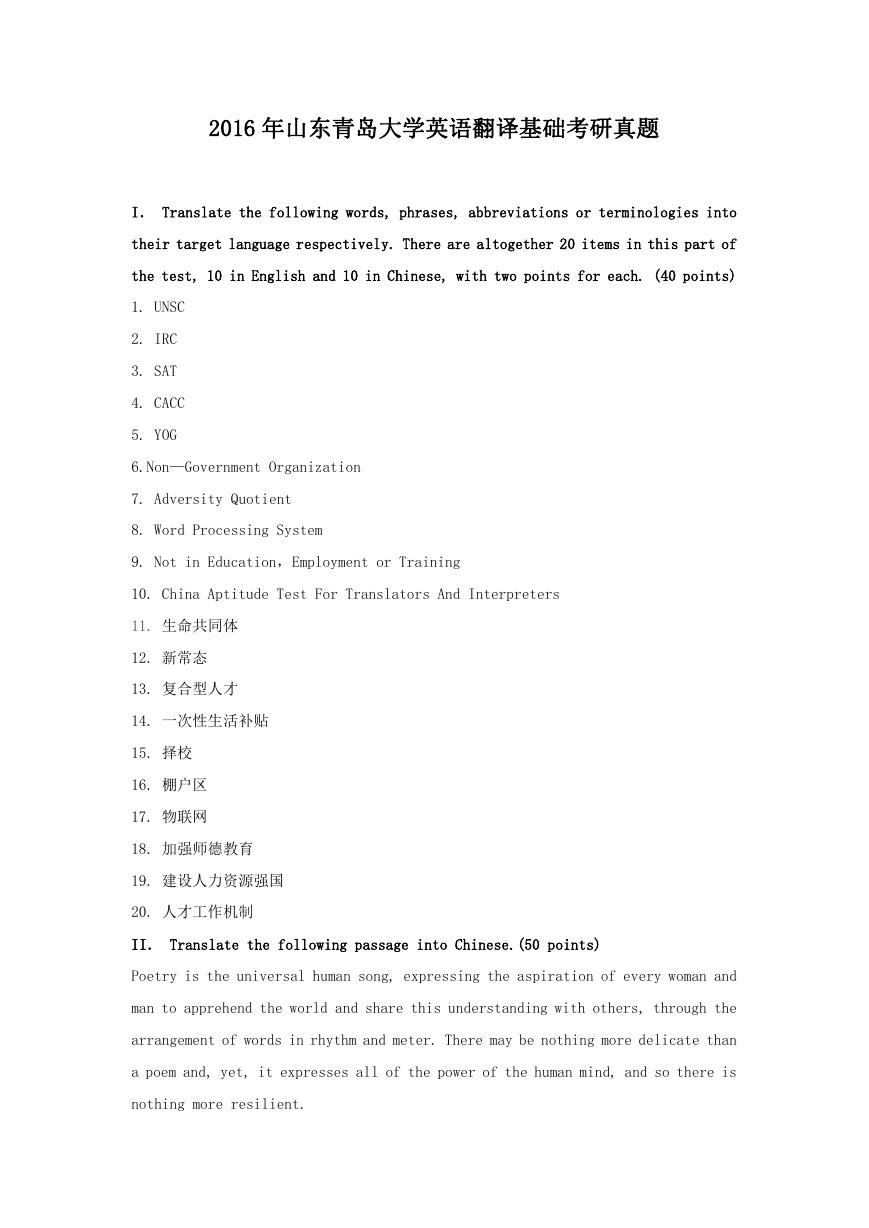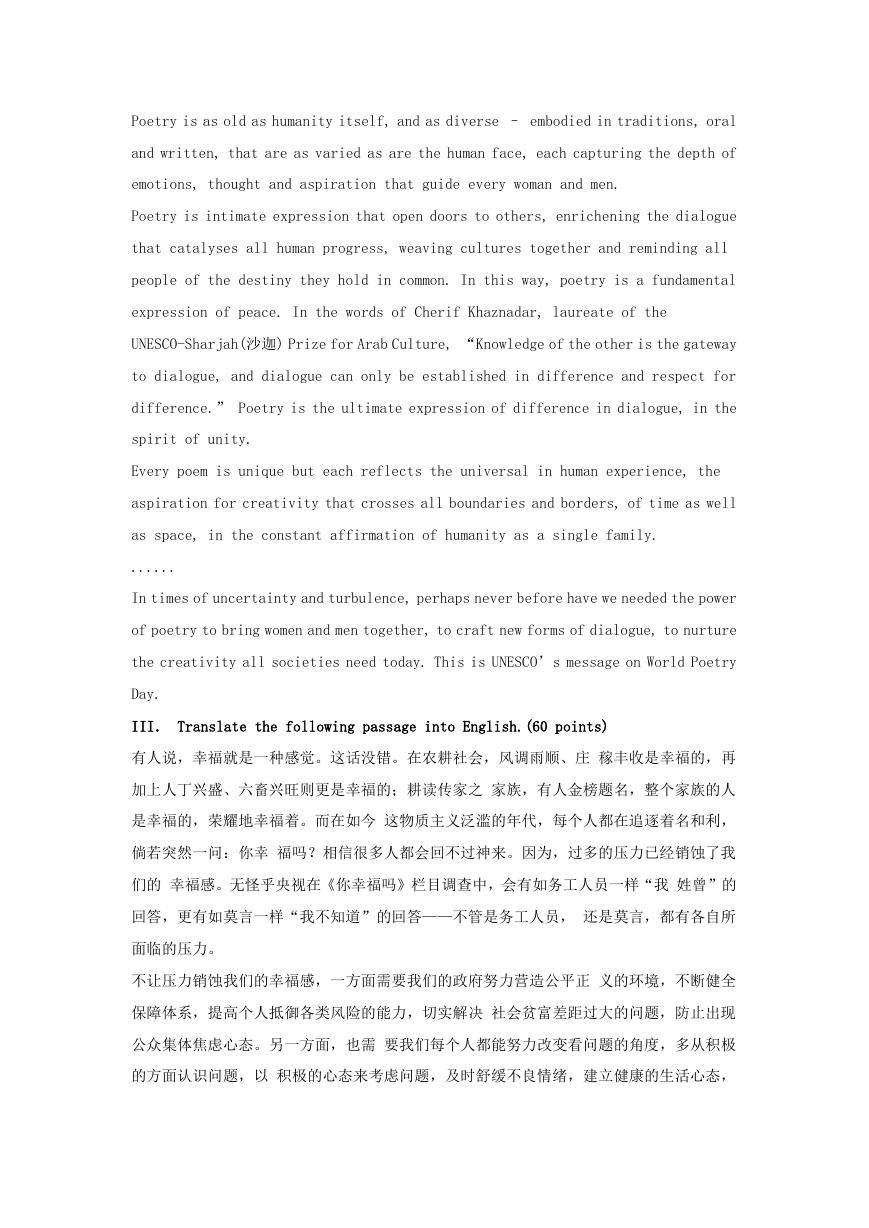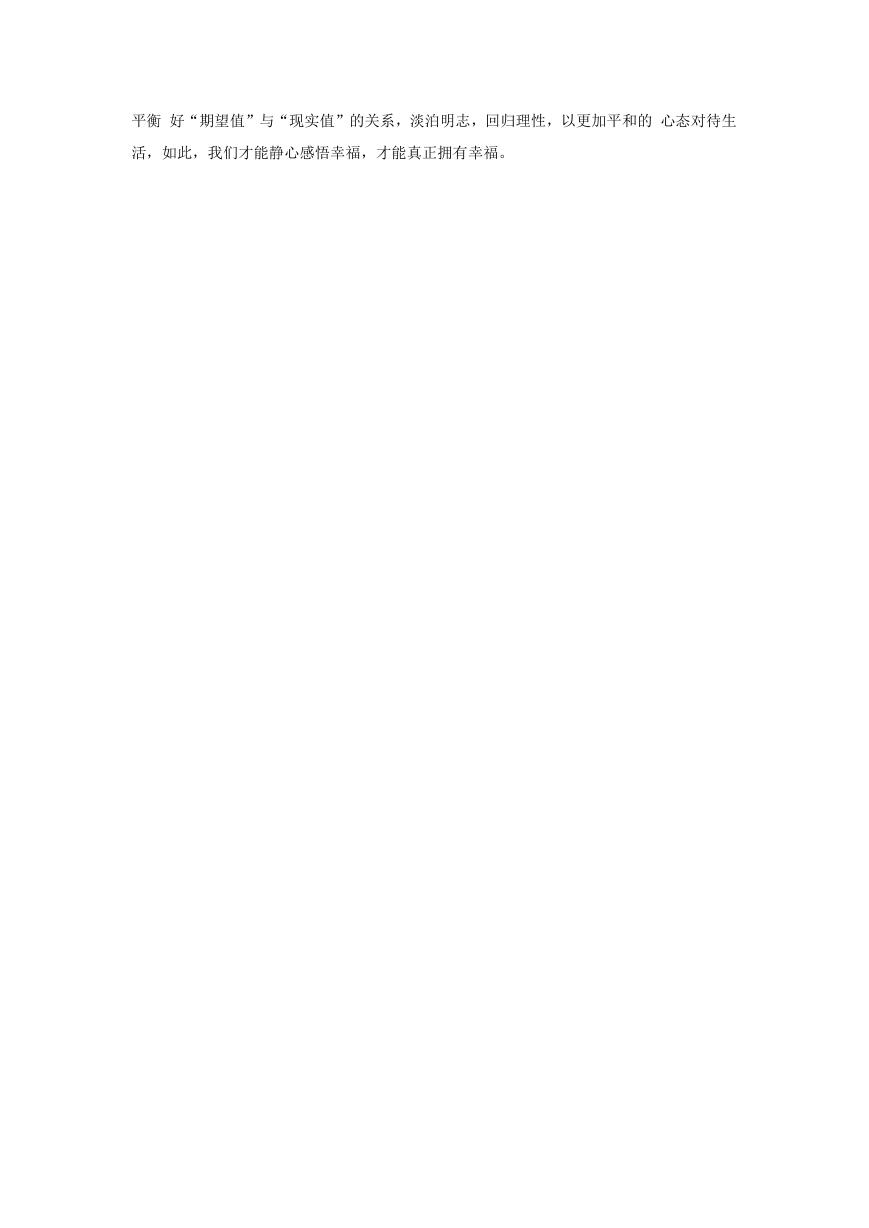2016 年山东青岛大学英语翻译基础考研真题
I. Translate the following words, phrases, abbreviations or terminologies into
their target language respectively. There are altogether 20 items in this part of
the test, 10 in English and 10 in Chinese, with two points for each. (40 points)
1. UNSC
2. IRC
3. SAT
4. CACC
5. YOG
6.Non—Government Organization
7. Adversity Quotient
8. Word Processing System
9. Not in Education,Employment or Training
10. China Aptitude Test For Translators And Interpreters
11. 生命共同体
12. 新常态
13. 复合型人才
14. 一次性生活补贴
15. 择校
16. 棚户区
17. 物联网
18. 加强师德教育
19. 建设人力资源强国
20. 人才工作机制
II. Translate the following passage into Chinese.(50 points)
Poetry is the universal human song, expressing the aspiration of every woman and
man to apprehend the world and share this understanding with others, through the
arrangement of words in rhythm and meter. There may be nothing more delicate than
a poem and, yet, it expresses all of the power of the human mind, and so there is
nothing more resilient.
�
Poetry is as old as humanity itself, and as diverse – embodied in traditions, oral
and written, that are as varied as are the human face, each capturing the depth of
emotions, thought and aspiration that guide every woman and men.
Poetry is intimate expression that open doors to others, enrichening the dialogue
that catalyses all human progress, weaving cultures together and reminding all
people of the destiny they hold in common. In this way, poetry is a fundamental
expression of peace. In the words of Cherif Khaznadar, laureate of the
UNESCO-Sharjah(沙迦) Prize for Arab Culture, “Knowledge of the other is the gateway
to dialogue, and dialogue can only be established in difference and respect for
difference.” Poetry is the ultimate expression of difference in dialogue, in the
spirit of unity.
Every poem is unique but each reflects the universal in human experience, the
aspiration for creativity that crosses all boundaries and borders, of time as well
as space, in the constant affirmation of humanity as a single family.
......
In times of uncertainty and turbulence, perhaps never before have we needed the power
of poetry to bring women and men together, to craft new forms of dialogue, to nurture
the creativity all societies need today. This is UNESCO’s message on World Poetry
Day.
III. Translate the following passage into English.(60 points)
有人说,幸福就是一种感觉。这话没错。在农耕社会,风调雨顺、庄 稼丰收是幸福的,再
加上人丁兴盛、六畜兴旺则更是幸福的;耕读传家之 家族,有人金榜题名,整个家族的人
是幸福的,荣耀地幸福着。而在如今 这物质主义泛滥的年代,每个人都在追逐着名和利,
倘若突然一问:你幸 福吗?相信很多人都会回不过神来。因为,过多的压力已经销蚀了我
们的 幸福感。无怪乎央视在《你幸福吗》栏目调查中,会有如务工人员一样“我 姓曾”的
回答,更有如莫言一样“我不知道”的回答——不管是务工人员, 还是莫言,都有各自所
面临的压力。
不让压力销蚀我们的幸福感,一方面需要我们的政府努力营造公平正 义的环境,不断健全
保障体系,提高个人抵御各类风险的能力,切实解决 社会贫富差距过大的问题,防止出现
公众集体焦虑心态。另一方面,也需 要我们每个人都能努力改变看问题的角度,多从积极
的方面认识问题,以 积极的心态来考虑问题,及时舒缓不良情绪,建立健康的生活心态,
�
平衡 好“期望值”与“现实值”的关系,淡泊明志,回归理性,以更加平和的 心态对待生
活,如此,我们才能静心感悟幸福,才能真正拥有幸福。
�






 2023年江西萍乡中考道德与法治真题及答案.doc
2023年江西萍乡中考道德与法治真题及答案.doc 2012年重庆南川中考生物真题及答案.doc
2012年重庆南川中考生物真题及答案.doc 2013年江西师范大学地理学综合及文艺理论基础考研真题.doc
2013年江西师范大学地理学综合及文艺理论基础考研真题.doc 2020年四川甘孜小升初语文真题及答案I卷.doc
2020年四川甘孜小升初语文真题及答案I卷.doc 2020年注册岩土工程师专业基础考试真题及答案.doc
2020年注册岩土工程师专业基础考试真题及答案.doc 2023-2024学年福建省厦门市九年级上学期数学月考试题及答案.doc
2023-2024学年福建省厦门市九年级上学期数学月考试题及答案.doc 2021-2022学年辽宁省沈阳市大东区九年级上学期语文期末试题及答案.doc
2021-2022学年辽宁省沈阳市大东区九年级上学期语文期末试题及答案.doc 2022-2023学年北京东城区初三第一学期物理期末试卷及答案.doc
2022-2023学年北京东城区初三第一学期物理期末试卷及答案.doc 2018上半年江西教师资格初中地理学科知识与教学能力真题及答案.doc
2018上半年江西教师资格初中地理学科知识与教学能力真题及答案.doc 2012年河北国家公务员申论考试真题及答案-省级.doc
2012年河北国家公务员申论考试真题及答案-省级.doc 2020-2021学年江苏省扬州市江都区邵樊片九年级上学期数学第一次质量检测试题及答案.doc
2020-2021学年江苏省扬州市江都区邵樊片九年级上学期数学第一次质量检测试题及答案.doc 2022下半年黑龙江教师资格证中学综合素质真题及答案.doc
2022下半年黑龙江教师资格证中学综合素质真题及答案.doc